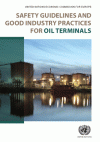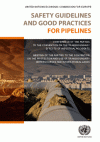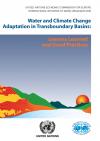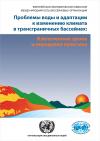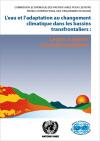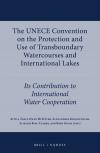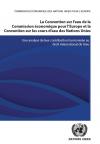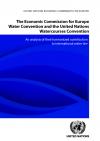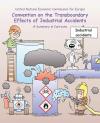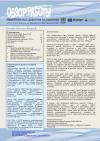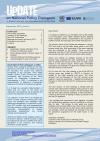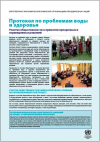Publications
Displaying Results 181 - 200 of 646
- Français
Transboundary water cooperation is necessary to manage shared waters in an integrated and sustainable way. It has the potential to generate many significant benefits for cooperating countries, such as accelerated economic growth, improved human well-being, enhanced environmental sustainability and increased political stability. Nevertheless, many challenges can prevent or delay countries from
- Spanish(西班牙语)
La cooperación en materia de aguas transfronterizas es necesaria para gestionar las aguas compartidas de manera integrada y sostenible. Tiene el potencial de generar numerosos beneficios importantes para los países que cooperan, tales como la aceleración del crecimiento económico, la mejora del bienestar humano, la mejora de la sostenibilidad ambiental y el aumento de la estabilidad política.
- English
Transboundary water cooperation is necessary to manage shared waters in an integrated and sustainable way. It has the potential to generate many significant benefits for cooperating countries, such as accelerated economic growth, improved human well-being, enhanced environmental sustainability and increased political stability. Nevertheless, many challenges can prevent or delay countries from
- English
The Safety Guidelines and Good Practices for Oil Terminals were developed within the framework of the United Nations Economic Commission for Europe (UNECE) project on hazard and crisis management in the Danube Delta involving the Republic of Moldova, Romania and Ukraine under the auspices of the Assistance programme of the Industrial Accidents Convention. The Conference of the Parties to the
- English
In response to the need to improve pipeline safety, the United Nations Economic Commission for Europe (UNECE) member countries decided to jointly develop safety guidelines and good practices for pipelines under two UNECE conventions — the Convention on the Transboundary Effects of Industrial Accidents (Industrial Accidents Convention) and the Convention on the Protection and Use of Transboundary
- English
The Strategic Framework for Adaptation to Climate Change in the Dniester River Basin brings together the data available today on the current and possible future trends in climate change in the Dniester basin. It offers a set of measures, the joint and coordinated implementation of which will make it possible to respond to the coming changes in a timely manner. The Strategic Framework is the
- English
The publication intends to compile, analyse and disseminate experiences, and thereby to demonstrate and illustrate important steps and lessons learned as well as good practices to take into account when developing a climate change adaptation strategy for water management in the basin or transboundary context. It includes lessons learned and good practices mainly from the programme of pilot
- Pусский
- Français
La publication vise à compiler, analyser et diffuser les expériences, et par la même à démonter et illustrer les étapes importantes, les enseignements tirés, ainsi que les bonnes pratiques à prendre en compte lors de l’élaboration d’une stratégie d’adaptation au changement climatique pour la gestion de l’eau dans un bassin ou un contexte transfrontière. Elle comprend des enseignements tirés et
- English
- English
The book The UNECE Convention on the Protection and Use of Transboundary Watercourses and International Lakes: Its Contribution to International Water Cooperation edited by Tanzi, A., McIntyre, O., Kolliopoulos, A., Rieu-Clarke, A., and Kinna, R. and published by Brill/Nijhoff in
- Français
Approximately 40 per cent of the world’s population live in river basins that cross national borders. Transboundary river basins cover nearly one half of the earth’s land surface and account for about 60 per cent of global freshwater flow. These basins link populations and create hydrological, social and economic interdependencies between countries. Transboundary water cooperation is therefore
- English
Approximately 40 per cent of the world’s population live in river basins that cross national borders. Transboundary river basins cover nearly one half of the earth’s land surface and account for about 60 per cent of global freshwater flow. These basins link populations and create hydrological, social and economic interdependencies between countries. Transboundary water cooperation is therefore
- English
Since 2008, all assistance activities under the Assistance Programme are based on the Strategic Approach. The Strategic Approach is designed to enhance the efforts of participating countries in the implementation phase of the Programme and to grant sustainability in the countries of the activities organised.
The Approach outlines six working priority areas of high priority – that correspond to
- English
This brochure is a summary of report “Strengthening Cooperation in Adaptation to Climate Change in Transboundary Basins of the Chu and Talas Rivers (Kazakhstan and Kyrgyzstan)”. The report was developed based on cooperative study on potential impacts of climate change by Kazakh and Kyrgyz experts under the project "Promoting Cooperation to Adapt to Climate Change in the Chu and Talas
- English
The Convention on the Transboundary Effects of Industrial Accidents deals with prevention, preparedness and response to industrial accidents with possible transboundary consequences. Being informed of these topics is important - not only for policy makers, politicians, and industry representatives - but also for the public. The cartoons illustrate the main points of the Convention and its
- Pусский
The National Policy Dialogues is the main operational instrument of the EU Water Initiative (EUWI), an international partnership that aims to contribute to the achievement of the water related Millennium Development Goals. UNECE is the strategic partner supporting the policy dialogue process on IWRM. The OECD is the strategic partner for water supply and sanitation. Romanian Ministry of
- English
The National Policy Dialogues is the main operational instrument of the EU Water Initiative (EUWI), an international partnership that aims to contribute to the achievement of the water related Millennium Development Goals. UNECE is the strategic partner supporting the policy dialogue process on IWRM. The OECD is the strategic partner for water supply and sanitation. Romanian Ministry of
- Pусский
ECE/ENV/NONE/2013/1Download the flyer
- English
ECE/ENV/NONE/2013/1Download the flyer



